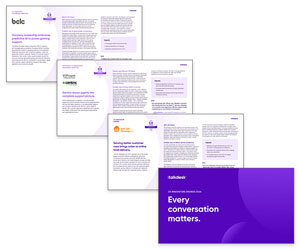We all know what good service feels like when we get it. Sadly we also know how bad service feels.
From a contact centre perspective good service is relatively easy to do. Carolyn Blunt explores three key areas.
The real challenge can be when other parts of the organisation service chain aren’t delivering and this is out of the control of your front-line advisors, yet they bear the brunt.
As leaders and managers it is up to us to work with other parts of the organisation effectively to remove factors that interfere with the great service the contact centre is capable of giving when these three ingredients are in place:
1. First impressions
Most agents will tell you that they know what type of call it is going to be in the first ten seconds. They listen to the caller’s tone, choice of words and decide, very quickly, if it is going to be a ‘difficult’ call or not.
Fair enough, but we need to be mindful of this: so do the callers. They listen to the agent’s greeting and very quickly decide whether they think they’ve got someone who is going to be helpful, interested and take ownership to solve the query or process the order effectively.
People from within the contact centre industry itself make well-tuned customers and I have known people to drop an agent and dial back for another one just on the strength of the greeting and the association they have made about the service they are about to receive.
Agents must be delivering a positive first impression if the perception of great service is going to be instilled. This is quite simple to do as it only comes down to an effective choice of words in the greeting and a positive voice tone.
If the greeting is too long, complex or your callers are straightaway asking a checking question such as: ‘Is this repairs?’ because the greeting used is ‘you’re through to property services’, then take note and make some changes. First impressions count hugely and it should feel easy and welcoming.
Getting security questions right
Consider what information is absolutely essential to gather from a caller before starting the proper call. Some organisations require full name, account number, first line of address and postcode from callers before asking ‘how can I help?’ If all the caller wants is your fax number it might be a bit annoying to callers to be made to jump through so many hoops first.
2. Listen
Callers often blurt out lots of information that the agent hasn’t asked for or the system screen hasn’t got to yet.
Some callers may want to have a ‘vent’ before the call can progress sensibly and during this ‘vent’ it is critical that the agent captures, on a notepad, what the key issues are. Asking a customer for information they’ve already given but that wasn’t noted down is a sure-fire way to wind them up.
I always encourage agents to have a jotter pad and a pen on the desk, no matter how wonderful the system is.
Sometimes customers give details the system doesn’t want or need and jotters are a great way to capture everything before discussing solutions with the customer and putting the right information into the system in bullet point format that another agent can pick up and read quickly in the future, as opposed to paragraphs of unnecessary call text.
Sometimes too much information can be as challenging as not enough!
3. Rapport
Establishing rapport with callers is critical to giving great service. Some customers will be relaxed and friendly with time to chat, others will just want a brief, business-like transaction.
Rapport can be achieved with any customer by flexing to meet their preferences. A skilled agent will detect very quickly what the appropriate tone and style should be and deliver accordingly. Others can learn from this example – consider discussing in team meetings who agents find it easy or difficult to build rapport with and share ideas for what has or hasn’t worked in practice.
The halo and horns effect
Agents should be aware of the ‘halo’ and ‘horns’ effect, particularly the ‘horns’ effect, as this can block rapport.
We all know the ‘horns’ effect in any contact centre where repeat callers ring in and all agents collectively groan at the sound of their name. The risk is that we pay attention to the negativity that reinforces our belief that this person is hard work, rude etc. and disregard any positive messages.
We all like to feel we are right, it is just human nature! Sometimes, agents can let their hackles rise and this can cause negative responses from the caller which might not have been present before.
Staying calm, objective and friendly can be challenging for any agent, day in, day out, when dealing with repetitive calls, and this is where good team leadership and camaraderie in the contact centre are important to keep the atmosphere positive and support agents to be consistently upbeat.
If you don’t feel good about yourself it is hard to give great customer service.
Rapport with callers is best supported when rapport exists between the team leader and agents and between agents themselves. This helps deliver great service as agents will support one another, keep promises on behalf of one another and take ownership to find solutions for customers. It will feel easy to do business with your contact centre and this is the essence of great service.
4. A great internal culture
Finally, let’s not forget that great customer service comes from a great internal culture.
Whilst it is vital to develop and support the front-line staff, it is also important to develop the rest of the service chain, who might be delivering critical parts of the service. Middle and back-office staff, field engineers, receptionists or other representatives need to be aware of the high service levels needed in the work they do, even if they feel they never see or speak to a customer directly.
If these areas understand how they can support the contact centre staff and communicate what the contact centre staff can do to help them, it helps to ensure that a ‘them’ and ‘us’ culture does not exist, where finger pointing and blaming abound.
Equally, senior management should role model the values of great service, communicate well and encourage people to challenge the status quo if it helps improve the customer experience.

Carolyn Blunt
Carolyn Blunt is a contact centre and customer service training expert with Real Results Training. If you enjoyed this article please visit www.real-results.co.uk. For more information on training your advisers cost-effectively in a refreshing style call 0161 408 2003.
Author: Jonty Pearce
Published On: 1st Dec 2010 - Last modified: 13th Jan 2025
Read more about - Customer Service Strategy, Carolyn Blunt, Customer Service, CX, Empathy, Positive words, Rapport





















If customer service is so important to organizations, why do they use long, slow automated menus that loop back, then, beyond the menu, use people with foreign accents who are unable pronounce the name of your city or comprehend the spelling and pronounciation of common American names containing more than one sylable?
I not only drop a representitive if I sense they will be a chore, but I drop companies. I dropped Captital One and Mediacom for example. Anything was better than them when it came to customer serives (though not much better sometimes).
THANKYOU MISS CAROLYN BLUNT
HI, THIS IS SUNIL MOTWANI FROM MUMBAI
WHAT INFORMATION YOU HAVE GIVEN ME
IS EXCELLENT ABOUT THE CUSTOMER SERVICE PROFESSIONAL
I LIKED YOUR ARTICLE
I HAVE LEARNT A LOT ABOUT THE CUSTOMER RELATIONSHIP
AND CUSTOMER SERVICE PROFESSIONALISM
ACTUALLY, WHAT IS REQUIRED IS A CLEAR UNDERSTANDING
BETWEEN THE SPEAKERS THE RECEIVER OF THE CALL
AND THE SPEAKER .IT IS A PART OF INNER CULTURE
YOU ARE 100% RIGHT
THANKYOU VERY MUCH
I WILL CALL YOU LATER
HAVE A GREAT DAY
PLEASE KEEP IN TOUCH WITH ME FOR THIS TOPIC
THANKYOU
Had a few comments about‘Learnt’ or ‘Learned’?
‘Learnt’ is more common in British English, and ‘learned’ in American English.
We are a UK company and therefore use the British ‘learnt’ across our website.
hope this clarifies some of the questions we had!